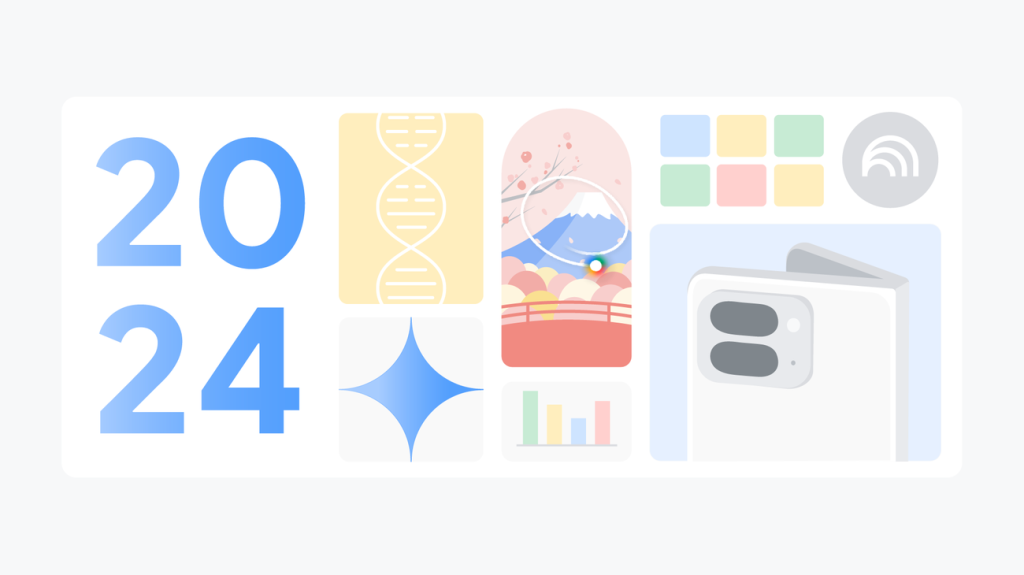60 Game-Changing Google AI Updates You Need to Know for 2024

As we bid farewell to 2024, it’s hard to ignore the footprint Google AI left this year. A slew of new features transformed everyday applications, making life a touch smoother. From unlocking Gemini’s potential to refining Search and Health tools, it’s been quite the journey. So, what caught everyone’s attention this year?
Diving headfirst into the world of tech, Google unleashed innovations that revamped our digital landscape. The advancements spread across various domains, including mobile technology and educational tools. With updates like Gemini 1.5 and Audio Overviews, the tech giant hasn’t just kept up, but set a scorching pace. Wondering which updates rocked the tech sphere this year?
January Starts with a Bang
The year kicked off with a whirlwind of activities as Google ushered in updates for Gemini, Chrome, and Pixel. One standout was ‘Circle to Search,’ where users could literally draw on their screens to search. New AI features in devices ensured a seamless dive into 2024, setting the stage for an eventful tech year.
February: Gemini’s Evolution Continues
February marked the much-awaited Gemini 1.5 debut, accompanied by the news that Bard would transform into Gemini. These announcements set the tone for Google’s ambitious AI expansions, focusing on generative tools for responsible tech development.
With a plethora of launches, ‘Gemini Advanced’ felt like a doorway to the future. AI for developers and researchers, like MusicFX, are pushing boundaries in Labs.
March: Health Takes the Limelight
In March, health-centric innovations took center stage. AI facilitated better access to essential information, broadening its impact beyond traditional tech spaces.
Google’s AI shone in travel and environmental applications, showcasing how it enhanced forecasts for natural phenomena like floods. Aimed at improving global connectivity, tech integration appeared seamless.
The focus widened through the first generative AI accelerator’s debut, bringing together 21 nonprofits eager to leverage AI’s potential.
April: Generative AI in Full Bloom
April showcased AI’s adaptability across diverse user groups, from developers to business owners.
The ‘AI Essentials’ course emerged as a highlight, designed to arm individuals with the skills needed to thrive in an AI-driven world. With AI skills surging, infrastructural developments were imperative.
Visual storytelling was redefined with AI tools, amplifying creative narratives for marketers and storytellers alike.
May: The Google I/O Extravaganza
May wouldn’t be complete without the Google I/O event, spotlighting innovations like the transformative AlphaFold 3.
Amid the buzz, Google I/O unpacked its vision for more seamless AI integration across platforms, focusing on making everyday tasks effortless.
For instance, Gemini’s role evolved to refine photo searches, while AlphaFold 3 propelled a leap in biomedical realms.
Also, Android’s XR advancements are steering devices toward a more immersive experience.
June: From Land to Sea with AI
June’s updates spanned both terrestrial and aquatic domains, revolutionizing interaction and understanding worldwide.
Google Translate expanded its dictionary, making communication even smoother with 110 new languages.
NotebookLM embarked on a global journey, unveiling better ways to fact-check and enhance educational utility. Overall, AI reshaped the educational landscape radically.
July: Google Features Expand
July’s highlights included deploying Gemini upgrades on Samsung devices, accelerating responses and access.
Also, AI paved new paths in sports, collaborating with Team USA in Olympic pursuits.
Educational advancements took a leap from software integrations to Gemini’s innovative learning tools.
The Coalition for Secure AI ensured that user safety and ethics were central to Google’s AI application.
August: Innovation Through Devices
August saw Google hardware innovations, with the ‘Made by Google’ event taking the spotlight. From the Nest Learning Thermostat to the Pixel 9, AI’s role became undeniable.
Gemini brought smart assistance to mobile devices, redefining user experience. Meanwhile, Chrome introduced fresh features to enhance browsing.
These updates collectively aimed to elevate everyday tech interactions, making devices smarter and homes more intuitive.
September: Google AI Goes the Extra Mile
September highlighted AI’s practicality, notably with quick wildfire detection using new satellite constellations.
Advancements in AI across Google’s suite showed promising support in managing emails and enhancing music discovery capabilities.
New Android features further cemented AI’s presence in everyday life, continuously innovating user interactions.
October: A Month of Multipurpose Updates
October welcomed updates for the Pixel and NotebookLM, enhancing devices from headsets to tablets.
AI in Search broadened its query handling capabilities, paving new paths for retailers to reach target demographics.
November: Unleashing Creativity and Convenience
November introduced Gemini API expansions, opening creative doors for developers and chess enthusiasts alike.
Google Lens and Shopping updates streamlined holiday preparations, proving AI’s versatility.
Corporations and users explored deeper AI functionalities, reshaping their approach to tech tools.
December: A Glimpse of Google’s AI Future
December marked the start of Google’s next AI chapter with Gemini 2.0 and revolutionary quantum chips.
Generative AI offerings broadened on Android, Pixel, and in developer platforms like AI Studio and Vertex AI.
By embracing quantum and AI synergies, Google poised itself for groundbreaking innovations in 2025.
As the curtain closes on 2024, Google’s AI journey unveils not just tech marvels, but a vision for a data-driven future. Their strides hint at even more groundbreaking possibilities. Here’s to a year where the tools around us became a little smarter, making our lives a tad easier.





